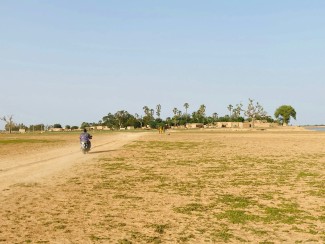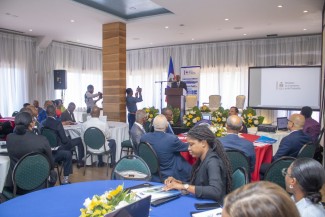EIF’s Steering Committee Chair talks donor priorities, laying the groundwork for investment in LDCs and more
How can donor countries like Denmark best support least developed countries (LDCs) in these uncertain economic times?
LDCs account for only 1% or less of world exports. Global value chains are being disrupted to some extent, and there is a trend now toward more regional value chains. And there is a tendency toward slowing growth. As donors, we believe we should focus more on sectors in LDCs where there is real potential for export, so I mean be selective in the sectors in which we work.
That is also why we believe the Enhanced Integrated Framework (EIF) diagnostic work in trade is important with regards to that. We believe EIF is unique in the sense that there is no other international actor that has an exclusive focus on LDCs and trade. That is important for us, and on top of that the trade policy integration in government policies, the capacity building, the projects that work with productive sectors.
What are Denmark’s priorities in supporting LDCs?
For us, it’s important that we target the LDCs. It’s important that we support projects and activities where it’s not only about production, it’s also to have the development angle. That is very important to have sustainability. It’s all about creating sustainability and creating growth – and creating decent jobs is an important component.
The way we handle aid for trade in our assistance is as an integral part of private sector development. Some donors have specific aid for trade departments and policies but we have it integrated in our private sector development. Our bilateral programs almost all have value chain components, and some also focus on exports and trade. Others support value chains in countries. But we don’t really distinguish that much between private sector development and aid for trade.
Do you see donor support to LDCs shifting in any remarkable ways?
We were a bit disappointed when the Global Aid for Trade Review came out in 2017 to learn that there was a limited amount of donor support for trade facilitation and the digital economy, and this includes Denmark. We know there’s potential in the digital realm, but then again it’s always about priorities.
When we look at aid for trade and think about priorities we are also thinking about the Sustainable Development Goals (SDGs) in 2030. A lot of activities can stimulate the SDGs, but it was a surprise that there were only a small number of donors supporting trade facilitation and digital commerce. Trade facilitation is now moving in the right direction, but digital economy assistance is still lagging behind – at least that’s my impression.
What about the private sector? Do you see solutions coming from that space?
Everyone realizes that private sector engagement is essential. We as donors and for global companies, we all have a responsibility. Host countries also have a big responsibility to create the right frameworks, to protect foreign direct investment (FDI), to make sure their goods are accessible. Only through doing that can one develop business in countries. Host countries need to be willing to adjust national policies to accommodate and invite FDI.
Liberalization is also part of it. I chair Ethiopia’s Working Party for World Trade Organisation (WTO) Accession. Ethiopia would like to be a member of the WTO and they have been through a long process of adjusting their own systems and liberalizing – we are starting the negotiations and moving down a very positive road.[1]
Environmental protections are an important global concern? How does that fit into Denmark’s trade support to LDCs?
Our government just passed in Parliament a new climate law, so Denmark will reduce emissions by 70% by 2030. This is Denmark being an initiator. There will be a lot of costs related to it, but this is only sustainable if other countries also act.
But we have to think in relation to climate what we do in our external relations as well, and together with a few other countries we are searching avenues for collaboration linking trade and climate. This is more visionary, but you also have to see the whole perspective. Leading up to the WTO Ministerial in Kazakhstan, we have to stimulate the discussion. We have to look into this and take initiative and run some risks and commit funds.
If you look at the private sector, those investing in these markets, they have some ideas. Hopefully they will see the link. There is a lot of impact investment out there. I’m sure our government when it puts together its development priorities for the coming years will be very keen to focus on climate mitigation and adaptation, we’ll have to do that in our development policy. But this will not work if its only driven by donors, so we need to show and also to see inviting moves from developing countries.
-------
[1] Ethiopia’s WTO Accession Working Party Meeting was held on 30 January 2020, after an eight year pause.
If you would like to reuse any material published here, please let us know by sending an email to EIF Communications: eifcommunications@wto.org.



